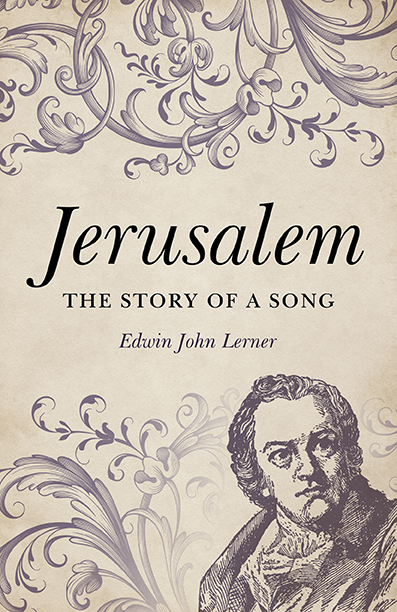Jerusalem
How sixteen lines written by an obscure poet and painter two hundred years ago became England's national anthem.

How sixteen lines written by an obscure poet and painter two hundred years ago became England's national anthem.
How sixteen lines written by an obscure poet and painter two hundred years ago became England's national anthem.
Great britain, History & criticism, Popular culture
Jerusalem: The Story of a Song is a popular history of England's unofficial national anthem, which began life as a poem by William Blake, was set to music by Hubert Parry and is sung every year at the Last Night of the Proms.
Click on the circles below to see more reviews
.......This book is a welcome introduction to the song it celebrates and to the poet/artist who is Blake. Edwin Lerner, a tourist guide by profession, has succeeded in writing a helpful and popular history which is an easy read. ~ Congregational History Society Magazine
Jerusalem: The Story of a Song, author Edwin John Lerner unearths more invaluable information and thoughts on the subject of how this poem became lodged in history as England’s unofficial national anthem. FULL REVIEW: https://annecarlini.com/ex_books.php?id=425 ~ Exclusive Magazine, Review
William Blake; Painter, poet and a man who if asked, would have described himself as an engraver and artist, was a man who did not fit easily into British society, was out spoken, socially uncomfortable and only happy when he was with his beloved wife, Catherine. This largely reclusive man with a strong social conscience wrote a poem titled Emanations of the Giant Albion which later became far shorter and immensely popular song, as it would turn out, known far and wide as Jerusalem; a sixteen-line verse now considered as essential to be sung at the last Night of the Proms, Sporting fixtures and Women’s Institute gatherings far and wide across Britain today. Many consider it the second national Anthem. But how did a poem written in the early 1800’s, first printed in 1808 become so famous, makes a wonderful story for the telling. Blake wrote the shorter version as a prelude to be included with Milton, a Poem, prior to the lines beginning “The Stolen and Perverted Writings of Homer & Ovid: of Plato & Cicero: …”(sic) As the years passed the poem was put to music by Hubert Parry at the request of the then Poet Laureate Robert Bridges, then Sir Edwin Elgar, to be used during the First World War to help boost troop morale, in what was beginning to seem like an endless massacre of men fighting against the German invasion of Europe. It was then adopted as the anthem for the “Fight for Right” movement established to support the War effort, which was somewhat ironic as both Blake and Parry would not have enjoyed their work being used in this manner. Parry was asked if his music could be used as a rally cry by the Suffragette Movement to which he agreed. He lived long enough to see women being granted a limited vote in 1918, but died shortly before the Armistice Day in 1918. 1928 saw the Women’s Institute adopt the song as their Anthem, which is still used today, and in the 1950’s Sir Malcom Sargent introduced it to the last Night of the Proms, where it has become a much loved end note for these world famous events. But its history has not ended with just a song, widely used throughout the length and breadth of Britain, as William Blake’s words have gone on to inspire the Oscar winning movie Chariots of Fire and the far more recent movie, Calendar Girls. That a quiet, anti-social man William Blake, artist, poet, engraver and husband could pen words that have carried down through more the 200 years is truly a tribute to the power of words, to patriotism and the passion people hold dear. Edwin Lerner has done a wonderful job tracing the journey of this beloved anthem down through the ages and tells it remarkable story with knowledge, a comfortable use of words and a passion that also carries through the many pages that make up the history of Jerusalem – the story of a song. ~ Bluewolf Reviews, https://bluewolf-reviews.com/books/history/jerusalem-the-story-of-a-song/
Eddie Lerner has written an excellent and detailed history of "Jerusalem" from its conception as part of a larger piece by Blake and its setting to music to its adoption years later by various bodies, up to the 2012 Olympic Games. His learning and background as a Blue Badge Guide add richness to the story. ~ June Marshall, Personal email to author
An amazing book which manages to include everything from the fate of Tom Paine's bones to the opening ceremony of the 2012 Olympics... ~ David Boyle, author of 'Broke: Who Killed the Middle Classes?, Personal email to the author